 |
 |
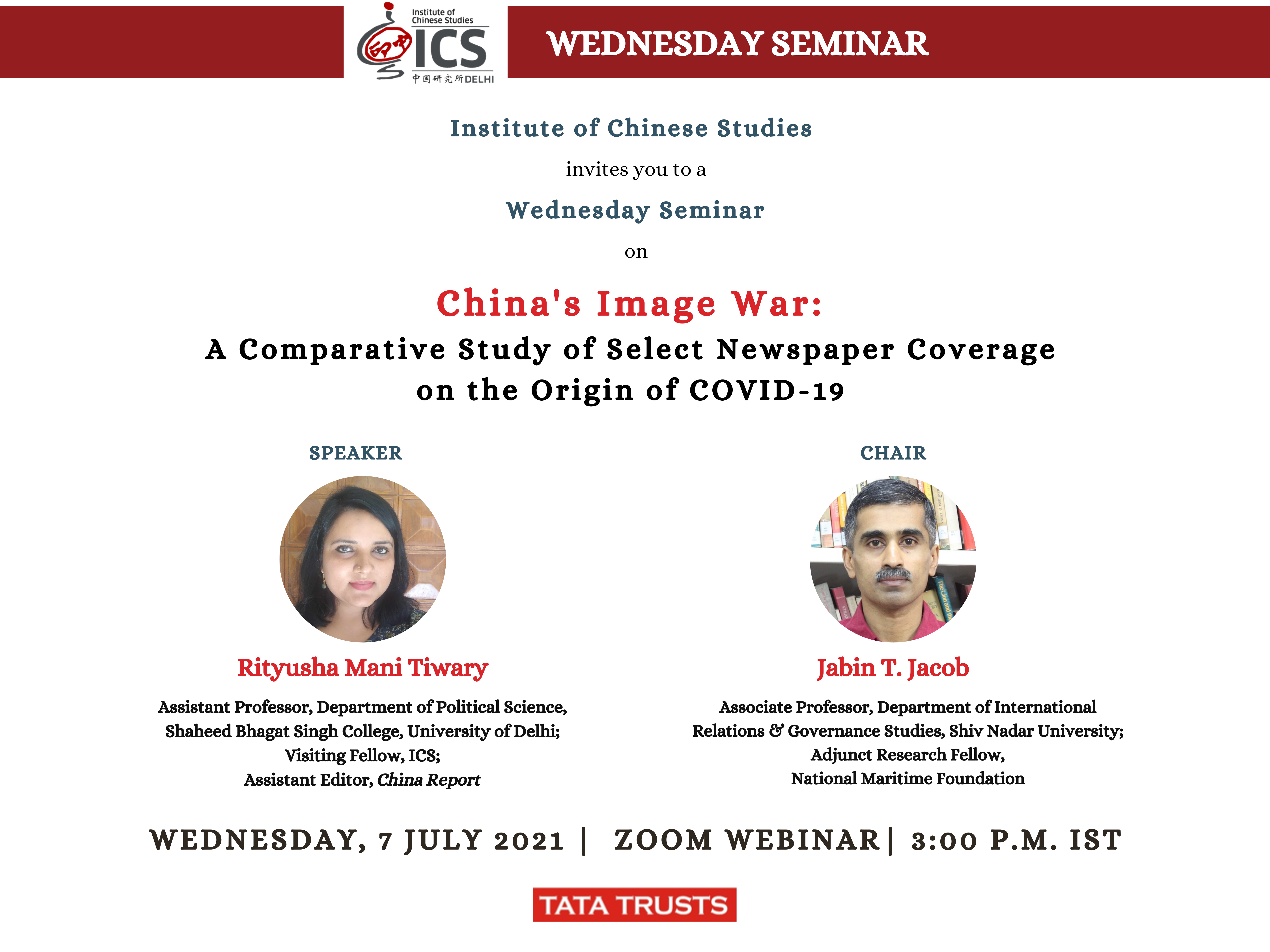 |
| |
| China’s image war- A Comparative Study of Select Newspaper Coverage on the Origin of Covid-19 |
|
Dr. Rityusha Mani Tiwary
Wednesday Seminar | Zoom Webinar |7 July 2021
|
| |
| As the COVID-19 Pandemic rages on in varying degrees worldwide, the debate surrounding the virus's origin has gained steady credence. The various gaps in information regarding the origin and spread of the virus have led to an image problem for China. For decades, China has been perceived as a rising power, and the varying nature of power wielded by its image has been forecast. A glaring mismatch has emerged between the news reportage from China and media coverage worldwide, casting a shadow on its positive image in the ongoing pandemic. While news reportage from China creates a simulacrum of a responsible and cooperative 'self', in contrast, western media coverage continues to unravel ambiguities in China's claims, pitching China as the 'other' in world politics. A pertinacious representation of a 'loveable' China on the one hand and the unreliable, duplicitous China, on the other hand, have led to an 'image war' for China that is going to be long drawn with significant ramifications. This talk analysed news coverage in two western dailies and two Chinese dailies (in English) regarding the virus's origin since the Pandemic outbreak in January 2020. It focused on two aspects- the most dominant frames used and their impact on China's image. Through a qualitative content analysis of the online editions of The New York Times, The Guardian, People's Daily and The Global Times, the framing and agenda-setting are investigated to compare and contrast China's image construction on either side. This talk built on the tradition of studying images in international relations by positing perceived and associated images constructed in this case. |
| Listen>> |
|
|
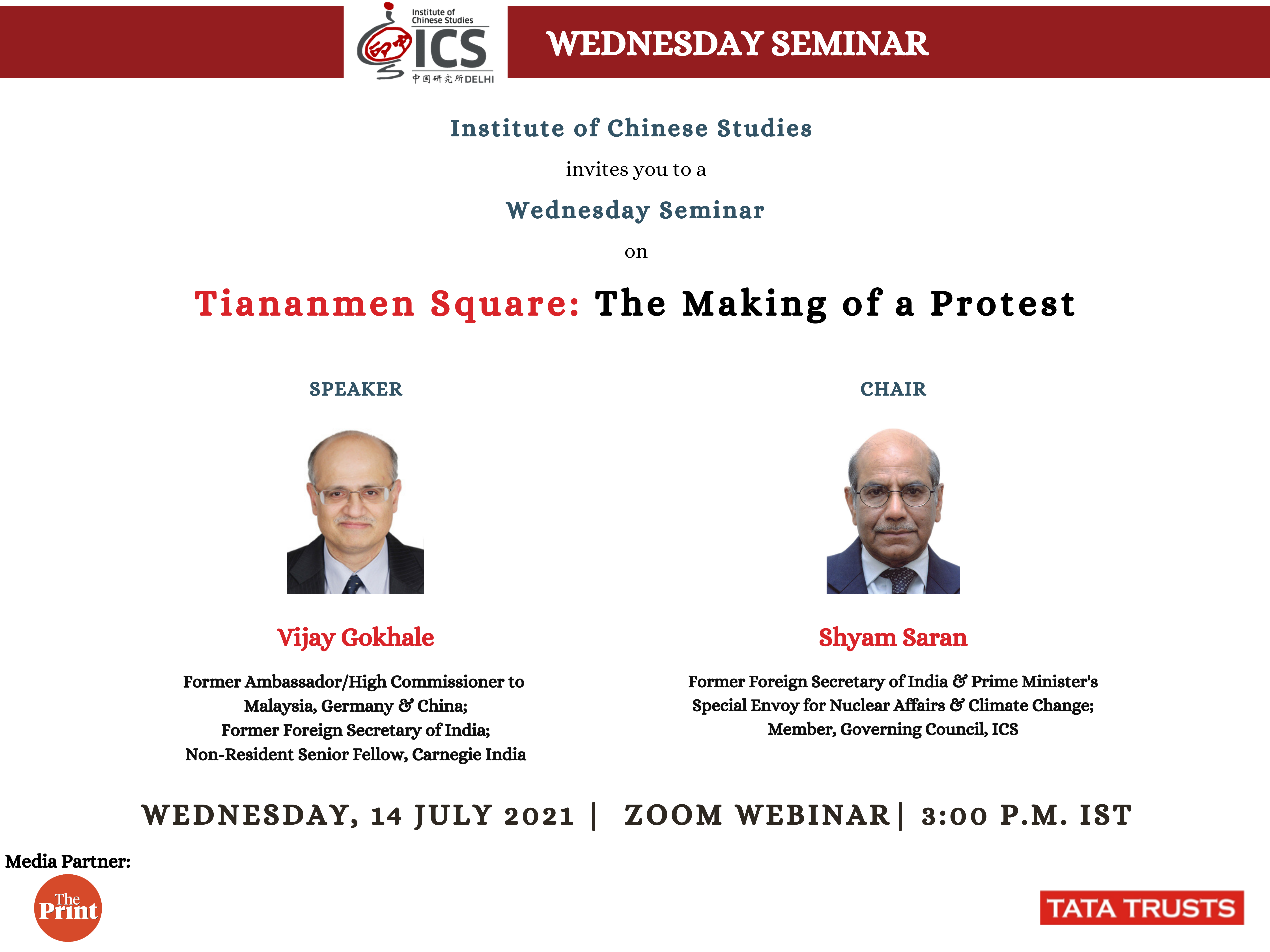 |
| |
| Tiananmen Square: The Making of a Protest |
|
Shri Vijay Gokhale
Wednesday Seminar |14 July 2021
|
| |
| This webinar was centred on the speaker's book "Tiananmen Square: The Making of a Protest", and explored ideas such as what China was like in the 1980s, the internal politics of the Communist Party and the causes of the Tiananmen Incident, as well as the relationship between China and Great Powers at that time. Why do the events of 1989 remain relevant in understanding China, and how do they influence politics and the Communist Party in China even today, thirty years after the incident? This question and others was discussed in the Wednesday Seminar. |
| Watch >> |
|
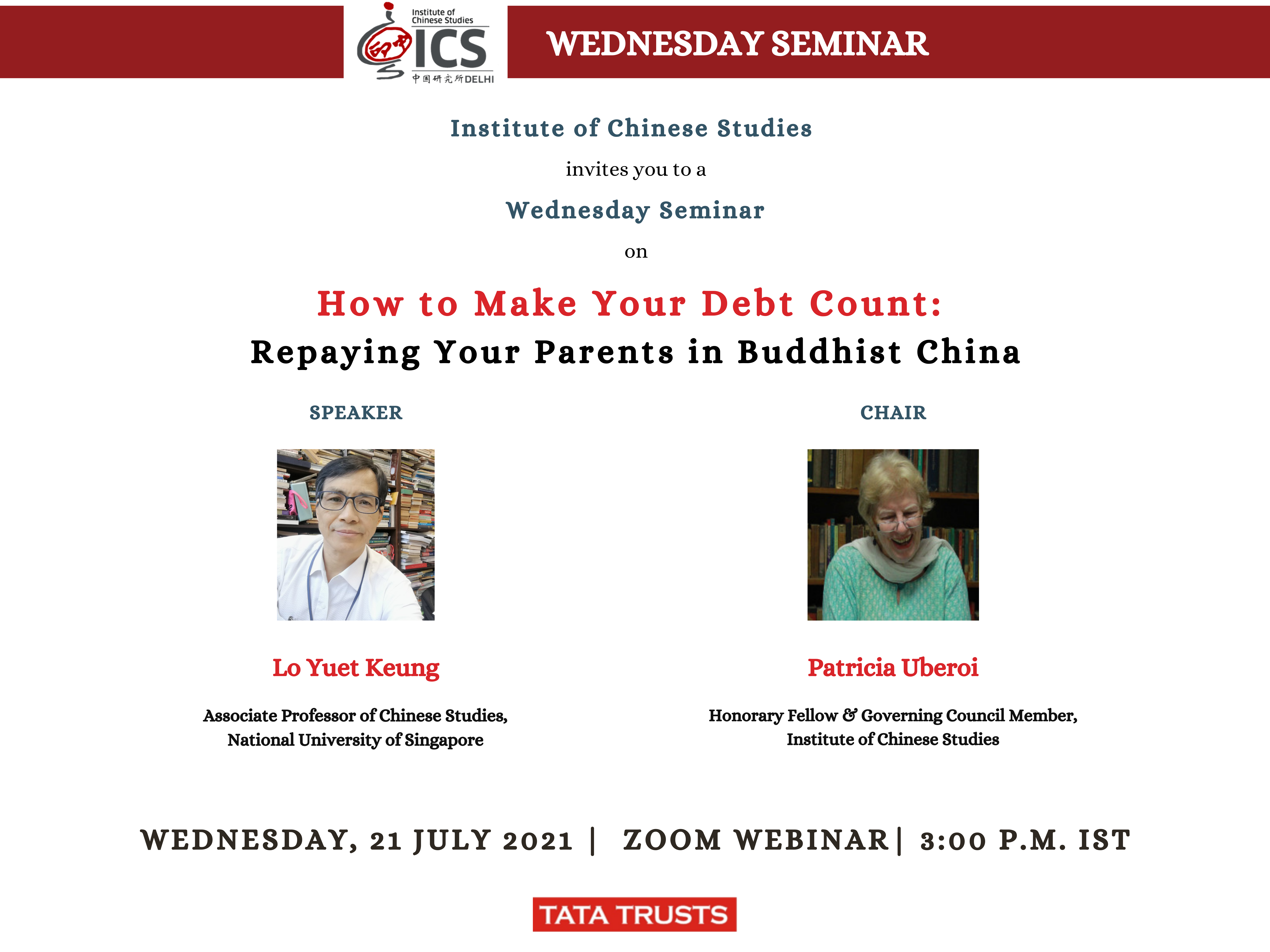 |
| |
| How to Make your Debt Count: Repaying Your Parents in Buddhist China |
|
Dr. Lo Yuet Keung
Wednesday Seminar | Zoom Webinar |21 July 2021
|
| |
| It is perhaps well known that filial devotion had been considered a cardinal virtue unique to Chinese culture in pre-modern China. Understood as such, it was then often translated into various cultural and even political practices. In early China, parents were generically glorified for giving birth and raising the children. Typically no concrete details about their hard work or sacrifice were given. In return, filial children were expected to take good care of their living parents; specifically, they were expected to make a name for themselves often in a political career and bring honour to the family. Filial sons were obliged to continue the bloodline of the family; inability to produce male offspring was deemed the gravest violation of filiality. When their parents died, children observed rigorous mourning rituals and continued to pay regular sacrifice to them thereafter. This changed when Buddhism was introduced to China. Buddhist converts would now serve their living parents differently and ironically, a new ideal of filiality overrode indigenous norms of filial conduct. Filial devotion was also given new expression as karmic reincarnation was believed to affect the post-mortem destiny of deceased parents. How to fully repay filial debts became a critical concern. In time the Buddhist influence even inspired religious Daoist conceptions of filial devotion that would work in tandem with the erstwhile foreign religion to change Chinese filial practices for good. This talk outlined the evolution of filial practices as a case study of cross-fertilization and mutual accommodation between Chinese culture and Buddhist religion in early medieval China. |
| Read More>> |
|
|
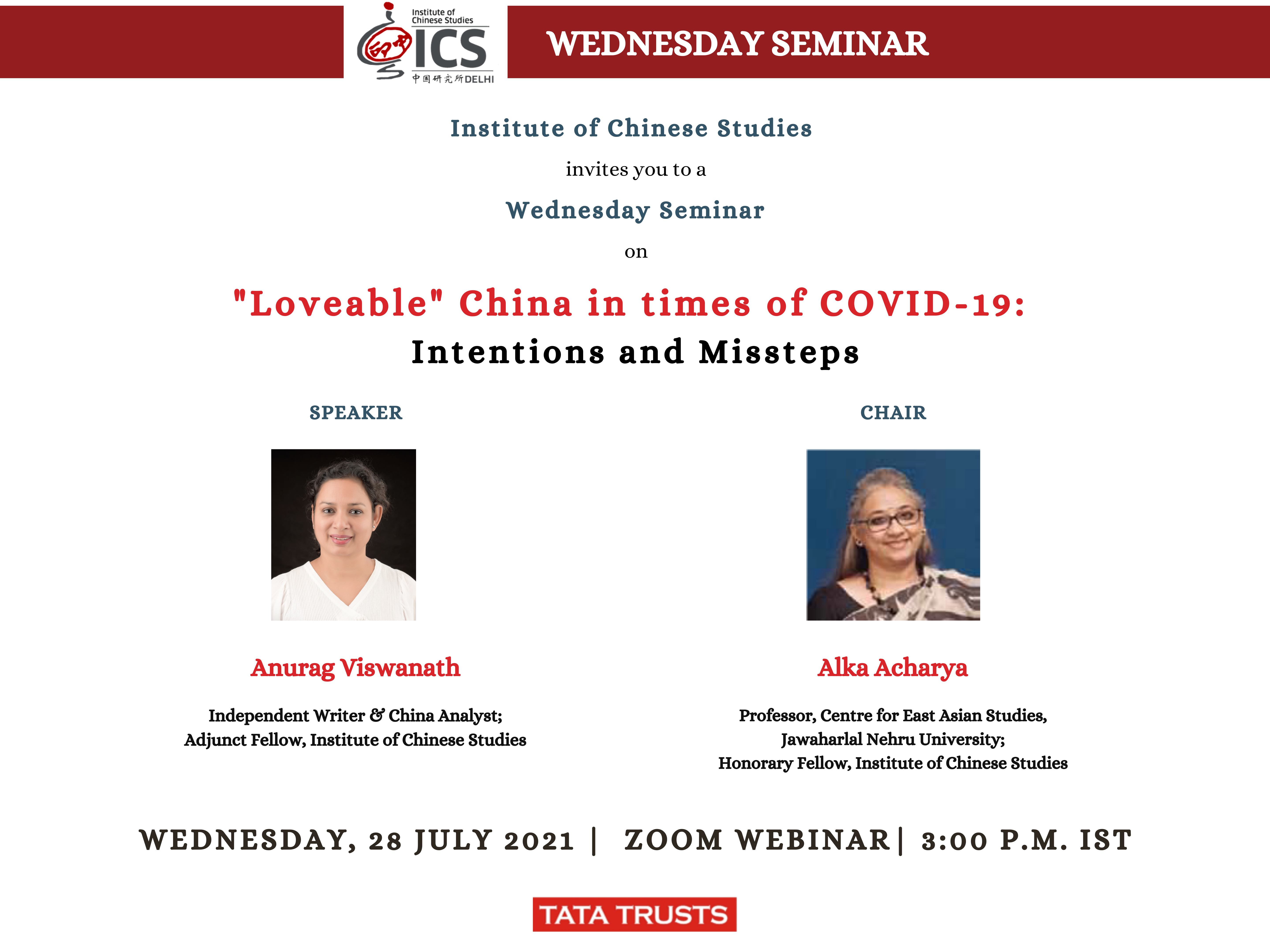 |
| |
| “Loveable China” in Times of Covid-19: Intentions and Missteps |
|
Dr. Anurag Viswanath
Wednesday Seminar | Zoom Webinar |28 July 2021
|
| |
| China's economic muscle and footprints have been on the rise in the world. So has China's outreach of its foreign policy. But proportionately, China's soft power has been on the decline. Despite being a 'rising' power, there has been a visible global pushback and backlash to both China's Belt and Road Initiative (BRI) as well as its "go-out" foreign policy. Several Chinese-backed projects, part of China's ambitious BRI are mired in controversy —accusations of China's neo-colonialism, political entrapment of the recipient countries due to unsustainable debt, low quality and benefits that accrue more to China have dented China's power-play in the world. In particular, China's "wolf warrior" diplomacy — an aggressive diplomacy where Chinese diplomats have veered back from diplomacy to take a pro-Communist Party line has received a setback. In several high-profile incidents, Chinese diplomats took a political stand, bickered and went on the offensive that resulted in a greater backlash, and did nothing to China's credibility and stature. China has been called a 'lonely power", a superpower that has not actualised or may not actualise due to the gap between its economic muscle and perceived moral authority; economic power and low soft power. But today, China has a new policy thrust, a corrective to make China "lovable". The effort is envisaged to rectify, correct and reverse the backlash of China's BRI, 'go-out" policy and low soft-power. How is "Lovable" China manifesting in policy and practice? The genesis of why this has emerged, how China seeks to achieve this and a critique of the evolving policy was the focus point of this talk. |
| Listen>> |
|
|
|
|
|
|
|
|
|
|
|
|
|
|
|
| |
 |
|
|
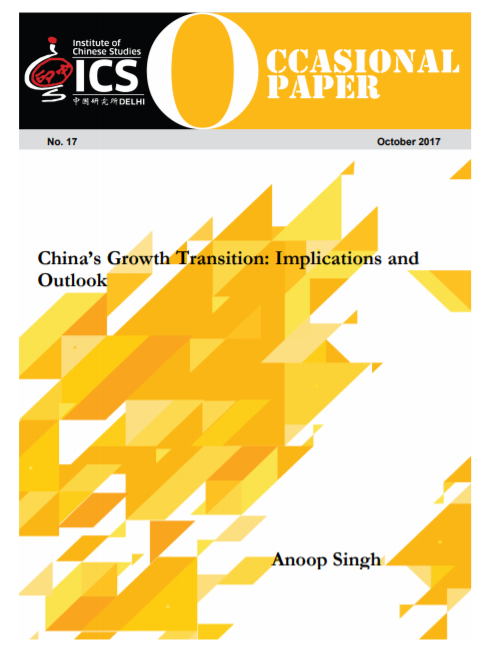 |
| ICS OCCASIONAL PAPER |
| |
|
Covid-19 and Online Learning in Rural China: Challenges, Impact and Opportunities
|
|
Prateeksha Tiwari |Issue No. 75 | July 2021
|
| |
| In response to the COVID-19 pandemic, schools across China remained shut after the Spring Festival break and 200 million school children started new semester in February online. To minimise the learning losses due to institutional closure in students, the Ministry of Education (MoE) launched ‘停课不停学’ (tíngkè bù tíngxué), roughly translated as “Suspending Classes Without Stopping Learning” ensuring uninterrupted curriculum-based instruction using networked cloud classrooms, online lectures, and pre-recorded videos sent via educational television. |
| Read more >> |
|
|
| |
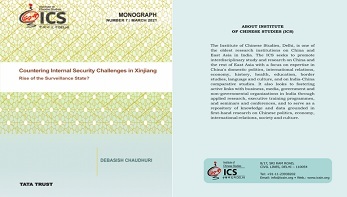 |
| ICS Monographs |
| |
|
Tanaka Shōzō 田中正造 (1841-1913): The Politics of Democracy and Equality in Modern Japan
|
|
Brij Tankha |July 2021
|
| |
| The East Asia Programme of the ICS has started the East Asia Series (Brij Tankha editor) to publish monographs and occasional papers covering subjects in history, political science, economics, culture, translations, and other areas relevant to the region. These will be refereed publications. The East Asia Programme began in 1999 with a project on the Asian Construction of Asia supported by the Japan Foundation. This is the first monograph to be published under the East Asia Series, with the aim to foster a better understanding of Japan. |
| Read more >> |
|
 |
| ICS ANALYSIS |
| |
| Taiwan: The Finest and Oldest ‘Thorn’ between China and the West |
|
Hemant Adlakha |Issue No. 134 | July 2021
|
| |
| Over three hundred and fifty years ago, when the West lost its first war with China over Taiwan, the technological level between the two sides was fairly even. But the Dutch, then the most dynamic colonial power, paid a heavy price for misbelieving “China might have invented gunpowder but we possess superior guns.” Today, the world is witnessing China’s rapid rise and the US is in decline. And Taiwan has returned as one of the thorniest issues in the US policy toward China under the Biden administration. Almost five months have passed but the new White House is yet to completely formulate its China policy framework. But as they say, the proof of the pudding is in the eating. |
| Read more >> |
|
|
|
| |
| ICS BLOGS |
| |
| The ICS Blog is a platform for an open dialogue that aims to inform and enlighten, especially young scholars and analysts on contemporary issues related to China and East Asia. |
| |
|
|
| |
 |
| |
|
| |
 |
| |
|
|
| |
|
|







